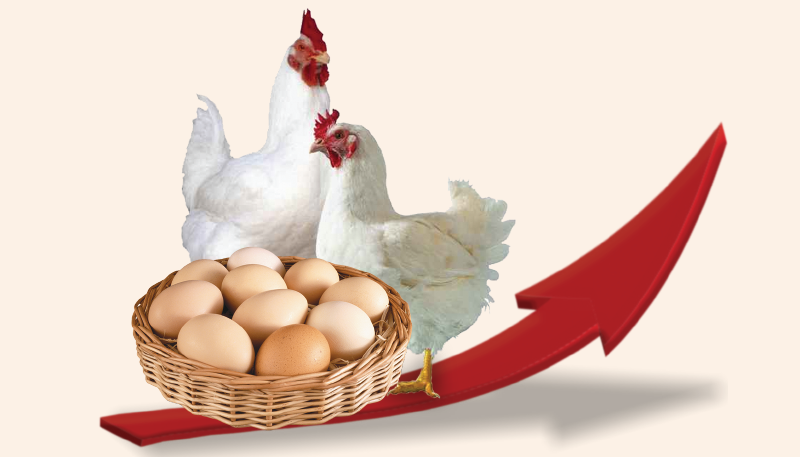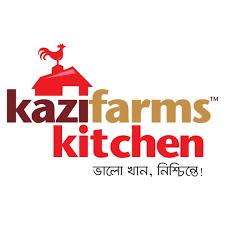As the prices of chicken and eggs continue to rise in the country, the direct impact of market volatility is being felt particularly by the middle and lower classes, who rely heavily on these sources of protein. Despite various ongoing crises, corporate entities in the poultry sector are recording substantial profits, according to a report of Bangla daily Bonik Barta.
Currently, three leading companies in the poultry industry—Kazi Farms, CP Bangladesh, and Paragon Poultry—have accumulated a total retained profit of nearly 27 billion (2700 Cr) Taka.

Retained profit refers to the amount remaining after a company has covered all direct and indirect expenses, income taxes, and paid dividends to shareholders. This figure is also viewed as the company`s reinvestable profit.
Amid the current market situation, these corporations are not only sustaining their operations but are also expanding significantly, leveraging their vast retained profits in the poultry sector.

The rising costs are raising concerns among consumers, as many struggle to afford these essential food items, highlighting the growing economic disparity within the country.
In Bangladesh, a handful of companies are responsible for the majority of chick and poultry feed production, as well as holding a significant share of the egg and meat markets.
These corporations not only operate their own production facilities but also engage many other farms through contractual agreements.
Despite their influential role, these companies maintain a level of secrecy regarding the market size, profits, and other business metrics.
They claim that their combined institutional control over the egg and meat markets does not exceed 15-20 percent. However, industry experts argue that these companies dominate the vast majority of the country’s poultry market, effectively controlling its dynamics.
There have been multiple allegations against corporate entities in the poultry sector for destabilizing the market.
The Bangladesh Competition Commission (BCC) found evidence of collusion among companies leading to an abnormal increase in egg prices in 2022.
As a result, Diamond Eggs and CP Bangladesh were fined a total of 35 million (3.5 Cr) Taka in January of this year, with Diamond Eggs receiving a penalty of 25 million (2.5 Cr) Taka and CP Bangladesh 10 million (1 Cr) Taka.
The ongoing situation raises concerns about market fairness and transparency in the poultry industry, as consumers continue to face rising prices for essential protein sources.
In the current poultry market of Bangladesh, several influential companies have emerged, including Kazi Farms Group, Narish, Paragon, Aftab, Quality, Provita, CP, Diamond Eggs, and Rashik/Jaman Group.

According to the recent financial reports obtained by the Bonik Barta indicates that Kazi Farms, CP Bangladesh, and Paragon Poultry collectively generated a total revenue of 90.61 billion (9061 Cr) Taka from their poultry businesses in the latest fiscal year.
During this period, the pre-tax profit of these three companies amounted to 3.66 billion (366 Cr) Taka, with their total retained earnings reaching 26.91 billion (2691 Cr) Taka.
It is noteworthy that the poultry sector was subject to a maximum tax rate of 10 percent on its revenue in the 2022-23 fiscal year.
In the market for broiler GP stocks, the top five companies control a substantial 85 percent.
A study conducted a few years ago by the Netherlands Embassy in Dhaka examined the corporate control in the country`s poultry sector.
The resulting report, titled "Poultry Sector Study Bangladesh," indicated that Kazi Farms Group holds the largest share of GP stock for meat chickens, with 49,000 GP broilers across two farms. Kazi Farms alone accounts for 34 percent of the broiler GP market.
The company operates seven farms for broilers and layers, producing one-day-old chicks, and its slaughterhouse has the capacity to process 10,000 chickens daily.
Additionally, Kazi Farms has a total of 13 hatcheries and two feed mills, further solidifying its position as a leading player in the industry.
As the poultry market continues to expand, the dominance of these corporations raises concerns about competition and pricing for consumers across Bangladesh.
Kazi Farms Limited has reported total sales of 39.38 billion (3938 Cr) Taka for the fiscal year from July 2022 to June 2023.
During this period, the company achieved a pre-tax profit of 1.75 billion (175 Cr) Taka, while its total retained earnings stood at 16.86 billion (1686 Cr) Taka as of June 30 of the previous year.
While talking to Bonik Barta Kazi Farms Group Director Kazi Jisan Hasan commented on the financial results, stating, “The profit generated from significant investment in the poultry sector can be considered a negligible return. Additionally, all retained earnings have been reinvested back into the poultry business.”

Meanwhile, CP Bangladesh Company Limited, a Thailand-based multinational, entered the Bangladeshi poultry market in 1998.
The company produces chicks, poultry feed, and eggs, and is also involved in the poultry-based fast-food business.
From January to December 2023, CP Bangladesh reported total sales of 43.53 billion (4353 Cr) Taka from its poultry operations, with a pre-tax profit of 1.53 billion (153 Cr) Taka.
As of December 31, of the previous year, the company’s retained earnings amounted to 6.78 billion (678 Cr) Taka.
According to a report of Bonik Barta, Dr. Md. Akram Hossain, General Manager of CP Bangladesh, addressed the ongoing instability in the egg market, attributing it to lower production compared to demand.
He noted a long-standing decrease in the number of layer hens in the country, which has led to reduced egg production.
Recent floods have further exacerbated the situation, causing an additional decline in layer hen numbers.
According to company estimates, daily production is currently falling short by approximately 5 to 8 million (50-80 Lac) eggs.
Dr. Hossain explained, "The gap in layer hen numbers cannot be filled quickly.
Unlike broiler chickens, which can meet demand within six months, the shortage of layer hens persists."
He added that while companies are incurring losses on chick production, poultry feed and eggs are still being sold at a profit.
Since May 19, 2023, CP Bangladesh has ceased commercial egg production.
Currently, corporate entities control about 15-20 percent of the poultry market, with a significant portion still managed by small-scale farmers.
The involvement of middlemen often contributes to market volatility, leading to inflated retail prices for eggs, which he described as "unreasonable."

Paragon Poultry Limited, a significant player in the country`s poultry business, operates under the Paragon Group, which also includes three other entities: DENAM Poultry Complex (Private) Limited, Rangpur Poultry Complex (Private) Limited, and Usha Poultry Limited.
From July 2022 to June 2023, Paragon Poultry reported total sales of 7.7 billion (770 Cr) Taka, with a pre-tax profit of 380 million (38 Cr) Taka. As of June 30, of the previous year, the company`s retained earnings reached 3.27 billion (327 Cr) Taka. Aminul Islam, Chief Financial Officer of Paragon Group, has given no statements despite efforts being made to reach him.
In response to the recent increase in chicken and egg prices in Bangladesh, Mahabubur Rahman, President of the Breeders Association of Bangladesh, explained that while broiler chicken production remains stable, egg production has fallen short of demand. He attributed this decline to severe heat from June to August, which led to the deaths of many chickens and reduced egg-laying activity due to illness. Additionally, flooding in several districts has damaged farms, resulting in a production decrease of 5 to 6 million (50-60 Lac) eggs.
Rahman noted another contributing factor: delays in the arrival of various vegetables in the market have led to increased demand for eggs. He emphasized that companies are selling eggs at the government-mandated prices while still maintaining profitability. However, he pointed out that middlemen are taking advantage of the situation by driving up prices. “There is no opportunity for hoarding eggs to create an artificial shortage in the market,” he asserted.
According to statistics from the Department of Livestock Services, Bangladesh`s poultry production for the fiscal year 2023-24 is projected at 327 million (32.77 Cr) chickens, with egg production expected to reach 23.75 billion (2375 Cr) pieces, resulting in an annual per capita consumption of 135 eggs.
Nonetheless, stakeholders in the poultry sector have raised concerns about the accuracy of government statistics, arguing that actual production levels are lower than reported. In light of the recent price hikes, the government has authorized the import of eggs, although this measure has not yet stabilized prices.
Following a meeting with egg producers and suppliers, the government has set new price guidelines: producers will sell eggs at 10.91 Taka per piece, wholesalers at 11.01 Taka, and retailers at 11.87 Taka. To mitigate the influence of middlemen, it was decided that large companies and small farmers would directly supply eggs to wholesale markets at these government-determined prices.
Bangladesh`s leading egg-producing districts include Kishoreganj, Mymensingh, Rajshahi, Tangail, Barisal, Bhola, Comilla, and Feni, with Kishoreganj being the most prolific. The district produces over 2.3 million (23 Lac) eggs daily from 1,390 layer farms.
Read More: Awami League labels interim government `Illegal` over granting immunity to criminals
According to Dr. Subhash Chandra Pandit, the district livestock officer, the daily demand for eggs in Kishoreganj is 1.7 million (17 Lac), with the surplus supplied to other districts. In Mymensingh, 972 layer farms produce approximately 2.18 million (21.87 Lac) eggs daily, as reported by the district livestock department.
Dr. Wahedul Alam, the district livestock officer, confirmed that local demand is met, with excess eggs being sent to Dhaka and other districts. Rajshahi boasts 1,286 layer farms that produce over 1.82 million (18.26 Lac) eggs each day, totaling around 54.8 million (5.48 Cr) eggs monthly.
Of this, 48 million (4. 80 Cr) eggs are supplied to the local market, while the remaining 6.8 million (68 Lac) are distributed to other areas of the country. In Barisal, 194 layer farms currently produce an average of over 940,000 eggs daily, with nearly 200,000 more eggs produced than the local demand.
Dr. Md. Mostafizur Rahman, the district livestock officer, attributed the rising prices to the influence of middlemen despite the higher production levels. However, recent flooding has severely impacted egg production in Feni.
According to Foyez Ahmed, convener of the Feni District Poultry Industries Association, the district previously produced over 600,000 eggs daily.
The sudden and devastating floods submerged nearly all farms, leading to significant losses in both chickens and egg production. Although some farms have resumed operations post-flood, current production has fallen below 300,000 eggs per day.
Once a supplier of eggs to meet local demand and beyond, Feni now struggles to fulfill even its own needs.


















-20260301064029.webp)





-20260228080513.webp)



-20260224075258.webp)





-20260225072312.webp)
